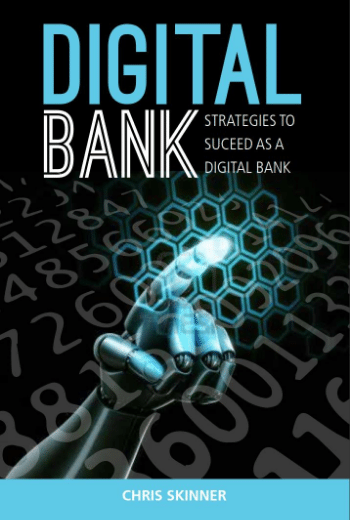
Since 2006, Chris Skinner has written and edited a wide range of books about banking.
The latest book released in the summer of 2014 is Digital Bank and has some pretty good reviews:

“I can honestly say this is one of the best books that I've read on the subject matter around what constitutes banking in the present, past and future.” David Brear, Digital Banking Director, Gartner Group
"The book is a treasure. Its really good and comprehensive." Kannan Swaminathan, Senior Vice President, Royal Bank of Scotland
“What is funny is that before we started work on New mBank we first had followed & got inspired by your insights. implementers need right and impactful guidance. This is the type of thought leadership that you stand for Chris.” Michal Panowicz, Head of the New mBank
“I think Chris has added tremendously to the conversation with this book and I highly recommend it.” Brett King, Author of Bank 2.0 and founder of Moven
“In Digital Bank, Chris Skinner shows why he is considered the foremost financial industry scholar.” Jim Marous, Senior Vice President at New Control
“This is an up-to-the-minute look at the challenges banks face as the information age goes into overdrive.” Michael Mainelli, Emeritus Gresham Professor of Commerce at Gresham College, London
“If you really want to understand how the financial world is changing, you must read this book.” Roy Vella, Mobile Services Expert, Speaker & Entrepreneur
“Digital Bank is couched in clear, direct language that readers of all levels of expertise will find accessible.” Kenneth Cline, Managing Editor, Banking Strategies
“This is not simply a must-read book for financial services execs. It should become a discussion tool for management teams, who should be assigned to read chapters to be discussed in management meetings.” Ron Shevlin, Author of Snarketing 2.0 and Senior Analyst at Aite Group
“Impressive in scope, incredibly relevant topics, current in time, and approachable in tone. Truly a worthwhile read, and hard to put down once you start.” David Desharnais, Chief Marketing Officer and SVP Product at Traxpay
“Whoever reads this book without swiftly moving to action, may regret it.” Guido Poli, Head of Market Intelligence, Banca Monte dei Paschi di Siena
In fact, one review on Amazon sums it up:
Thanks Mirko.
So, for those who want to read the wholly re-edited and brand, spanking, shiny new Digital Bank, just go to Amazon Kindle, Google Play, Kobo or Apple iTunes and download your Digital Bank today!
There are seven books produced as a series called The Complete Banker by Searching Finance. All books are based upon Chris Skinner's writing of his blog since 2006.
Book One: Money for Nothing and your Cheques for Free - How banks process payments from small transactions on your mobile telephone to international transfers of billions of dollars
If you think that money is important (and who doesn’t), then so is the ability to process money – in other words, payments. And that’s what this book is all about: from processing payments over the internet and on your mobile telephone; to payments via cards, cash and cheques; to massive international payments operations and the challenges faced by banks in these areas, including the continual vigilance needed to avoid money launderers and terrorists.
Book Two: Socialising the Antisocial Bank - Converting the antisocial bank by digitally connecting with customers to become part of their community
Most banks are anti-social. They don’t engage with customers to ‘delight’ or ‘exceed their expectations’, mainly because customers don’t expect anything different. That doesn’t mean it cannot change. The social media revolution is rapidly turning this planet on its head. So, if you want to work out how to be a social bank and connect with your targeted communities of customers, this is a short guide as to how to do it.
Book Three: It’s banking Jim, but not as we know it - Creating tomorrow’s bank by identifying the most critical strategic trends in banking today
The future is uncertain. However, if you could identify the most critical things likely to occur in the future today, then you could capitalise commercially upon the opportunities presented. So that’s what this book is all about: what are the most critical things that will occur in banking tomorrow that, if you invest in them today, mean that you can make your fortune. A simple enough premise, and one that I hold to be very true. So, if you want to work out how to the most successful bank you can be during the next decade, then this is the book for you.
Book Four: Not every bank is Goldman Sachs - Tracking the rise of algorithmic machines and high frequency trading through a deregulated investment world
Are the investment banks a dangerously out of control threat to the global financial system, or do they bring innovation and liquidity to the market and alpha returns to their investors? Whichever your view, the investment world is changing and you need to know which are the key trends to track. This book reviews all of these areas and more. So, if you want to understand capital markets and investment banking and just why they get those big bonuses, this is a short guide for you.
Book Five: The Extraordinary Madness of Banks - Understanding the credit crisis, and the bankers, regulators and politicians involved (second edition printed November 2011)
This is not a book about the financial crisis. This book is about the outcome. It tracks the markets from the day that Lehman Brothers collapsed, and before with Northern Rock, through the reactions of policymakers, politicians, regulators and markets. It shows where the weaknesses were in hindsight, and where the pitfalls may be in foresight. It tries to give the reader a chance to absorb and understand the key movements that created the crisis, and the explanation of why banks, bonuses and bosses are still at the trough feeding and greeding their way through the issues faced.
Book Six: Viking to Vickers via Victoria – A history of the City of London and why it leads the world’s financial markets
London has always been at the heart of the world’s trading activities from Roman and Viking times to the present day.Through Empire and Industry, London has cemented its position as the leading centre for finance.And by political and economic manoeuvring, has maintained that position throughout the last century, as the Empire disappeared and open borders created free trade.
It will be interesting to see where London’s position move over the next decade as reforms kick in to restructure London, to make it a safer place to trade once more.
Table of Contents
- How The City Developed, Part One: The Romans.
- How The City Developed, Part Two: The Vikings.
- How The City Developed, Part Four: The Tudors.
- How The City Developed, Part Six: The Bank of England.
- How The City Developed, Part Seven: Lloyd's of London.
- How The City Developed, Part Eight: the London Stock Exchange.
- How The City Developed, Part Nine: The 1700s
- How The City Developed, Part Ten: Victorians
- How The City Developed, Part Eleven: World Wars
- How The City Developed, Part Twelve: After World War II
- How The City Developed, Part Thirteen: The Big Bang
- How The City Developed, Part Fourteen: Crisis
Book Seven: Are bankers good or bad for society?
This book argues that bankers are good for society if the constraints that regulate them direct bankers to behave for the good of society. It makes clear that banking keeps society civilised as, without such controls, we would have anarchy and war. It argues that bankers historically have been constrained by religious shackles that, through the fear of God, made bankers behave appropriately. It asks what bankers fear today and whether the moral compass and lessening of religious beliefs is one reason why bankers have been bad. After all, the love of money is the root of all evil.
The book concludes that for bankers to be good for society, they have to have a fear of retribution and a strong moral compass. This will happen as the American culture of casino capitalism is replaced by an Asian culture of community-based consensus combined with Islamic finance influences.

There are also three books published by John Wiley & Company and written/edited by Chris Skinner:
The future of banking in a globalised world
The world of banking is changing dramatically as a result of regulation, technology and society. New developments in the past three years include advances in regulatory change, the impact of China and India; from the latest technologies to impact bank services, to the latest experiments with a cashless society. The Future of Banking in a Globalised World provides an entertaining yet informative look at the world of banking and chronicles the radical changes that have occurred in the industry.
The future of finance after SEPA
The impact of the Single Euro Payments Area (SEPA) and the Payment Services Directive (PSD) upon business and banking in Europe.
The future of investing in Europe’s market after MiFID
The Markets in Financial Instruments Directive (MiFID) is the biggest change programme Europe’s capital markets have ever attempted. Anyone who has anything to do with dealing, trading and investing in European equities and instruments will find this book an essential guide to the markets now and into the future.
Chris M Skinner
Chris Skinner is best known as an independent commentator on the financial markets through his blog, TheFinanser.com, as author of the bestselling book Digital Bank, and Chair of the European networking forum the Financial Services Club. He has been voted one of the most influential people in banking by The Financial Brand (as well as one of the best blogs), a FinTech Titan (Next Bank), one of the Fintech Leaders you need to follow (City AM, Deluxe and Jax Finance), as well as one of the Top 40 most influential people in financial technology by the Wall Street Journal's Financial News. To learn more click here...

